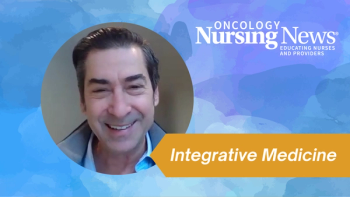
AE Education Aids Breast Cancer Decisions, Says Survivorship Expert
Planning for adverse effects early on helps patients prepare for what lies ahead, says Michelle Kirschner, MSN, RN, ACNP, APRN-BC.
When counseling patients with breast cancer who are deciding whether to remain on endocrine therapy after 5 years, oncology nurses and advanced practice providers should make patients aware of the potential adverse effects (AEs) that may be associated with long-term treatment, according to survivorship expert Michelle Kirschner, MSN, RN, ACNP, APRN-BC.
Kirschner, the director of program development at the Cancer Survivorship and Supportive Care Professionals Network, recommended educating patients about the AEs with later onset, such as osteoporosis and sexual health-related AEs. She emphasized that by informing patients early about what they could run into years into or after treatment, patients will not be caught off guard and will be better prepared to manage these AEs with their providers.
When patients are informed earlier, they and their care teams can plan for what’s ahead and incorporate what Kirschner calls doable changes, such as
Further, giving patients the knowledge of what lies ahead allows patients to make more informed decisions, particularly at the
Transcript
We want to give patients hope, and we can do that by coming alongside them and really wanting to understand what they are experiencing, helping them decrease [AEs], but being really honest about the long-term effects. We don’t want them to come 5 or 10 years later and say, “You didn’t tell me about this risk.”
Part of this is just educating about, “OK, these are things that we can help you with. These are things that you don’t have right now, but they might come along. I don’t want to surprise you. I want you to understand that, and that needs to be part of the decision that’s being made.”
We know that there are long-term and late effects that can occur. It’s one of the things that’s important: to always be monitoring and looking for them. The thing that’s really important is that we have a plan to support those [AEs]. It’s not enough to say somebody has fatigue, but we know now that
But there are some known long-term effects that you can’t avoid, and those are things like osteoporosis and other types of sexual health issues that you can help with, but they will be there because of the impact of these longer-term hormonal blockades.
This transcript has been edited for clarity and conciseness.
Newsletter
Knowledge is power. Don’t miss the most recent breakthroughs in cancer care.




































